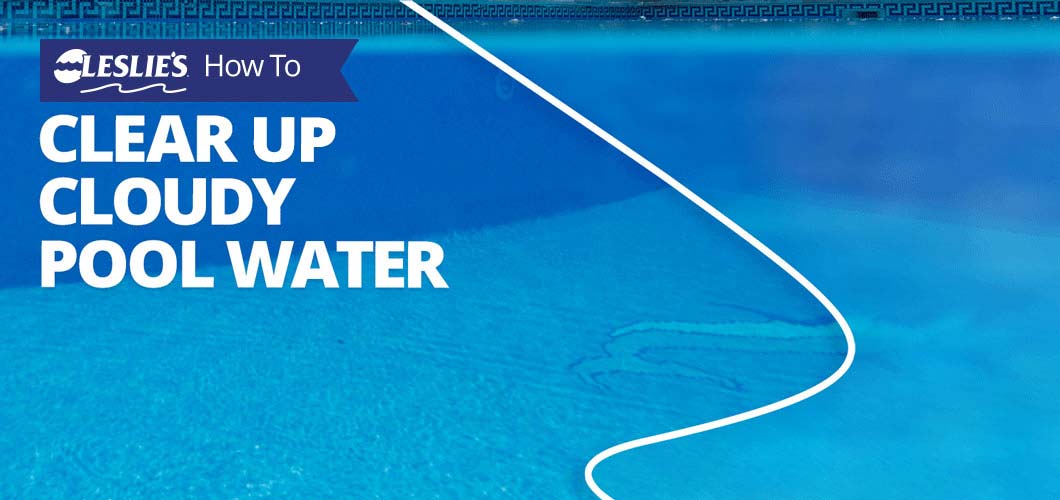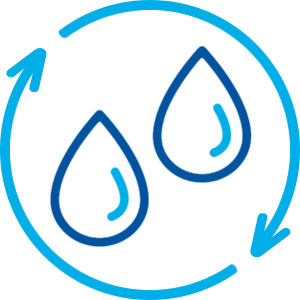
How to Quickly Clear Up Cloudy Pool Water
There is truly something special about a pool full of crystal clear water. It dazzles the senses, looks inviting, and makes you want to jump right in. Cloudy pool water, on the other hand, is quite the opposite. If you’ve owned a pool for any amount of time, chances are likely good that you’ve struggled with cloudy or murky pool water at least once or twice. In order to clear the water quickly, it’s important to get to the root of the problem. Pool water test strips, clarifier, and shock are crucial tools to combat this common pool issue.
What Causes Cloudy Pool Water?

Poor water chemistry causes most cases of cloudy pool water. Test your water to make sure it's properly balanced.

Chlorine issues often cause hazy-looking water. Adding a recommended dose of pool shock to your pool can clear it right up.

Poor circulation or filtration can contribute to water clarity issues. Make sure your pump and filter are working properly.

Weather events or increased swimmer use can cause cloudy water. Sometimes, all you need to do is add a pool water clarifier.
Some of the more common reasons a pool will turn murky include low or no chlorine, combined chlorine, water balance issues, poor circulation, filtration problems, weather events, and increased swimmer use.
How Do You Fix Cloudy Pool Water?
"Why is my pool cloudy?" Don't fret! If you follow the steps below, you'll be swimming in clear water again in no time. Before we get started, there are a few essential supplies you’ll need to have on hand.
Here are a few guidelines for common cloudy water scenarios:
Water Balance Issues
In most cases, factors related to water chemistry cause cloudy pool water. Since water chemistry changes almost daily, the first thing you’ll want to do is test the water. This will help determine the level of adjustment needed. If you're testing at home, use a test kit or pool test strips. Or, if you’re looking for the most accurate results, bring a water sample to your local Leslie’s for a free, comprehensive AccuBlue® water analysis and customized treatment plan. Use these results as a guide to correctly treat and balance your pool water.
Total Available Chlorine vs. Free Available Chlorine
As pool water warms in summer, more chlorine is needed to prevent your pool water from becoming cloudy. If there’s at least a 0.3 ppm difference between your Total Available Chlorine (TAC) and Free Available Chlorine (FAC) levels, treat your pool with pool shock. If FAC levels are above 2.0 ppm (parts per million), we recommend using a non-chlorine shock like Leslie’s Fresh ‘N Clear, which is an oxidizer with a built-in clarifier. It works by breaking up organic contaminants that bind to the chlorine and prevent it from doing its job. If FAC levels are below 2.0 ppm, keep reading...
No Chlorine
If your water test shows low — or no — chlorine levels, and your pool is cloudy, treat your pool water with a chlorine-based pool shock. This family of shock includes cal-hypo (calcium hypochlorite) or dichlor (sodium dichloro-s-triazinetrione). Using something like Leslie's Power Powder Plus 73 or Leslie's Chlor Brite will effectively sanitize and clear the pool water of contaminants, including bacteria, algae, and other organic material that cause cloudy water. Some clouding may occur while shocking, as the chlorine works to oxidize contaminants in the water. However, if the pool is still cloudy after shocking the water, keep reading.
BONUS TIP: In addition to monitoring chlorine levels, it's important to monitor other aspects of your water chemistry, too. For example, high Calcium Hardness and Total Dissolved Solids can contribute to cloudy pool water conditions. Unbalanced pH and Total Alkalinity can also reduce the effectiveness of your other pool chemicals. Balanced pool water is healthy pool water!
Poor Circulation or Filtration
If chlorine levels look good and there are no other issues with water chemistry, the next thing to check is your pool’s circulation and filtration system. When the pool is cloudy, but the chemicals are fine, try cleaning out the pump strainer and skimmer baskets, and check the pressure gauge on your pool filter. If the pressure reads 8–10 PSI higher than its starting (clean) pressure, the filter needs to be cleaned and/or backwashed. When filter media wears out, and the cleaning frequency increases, it may be time to invest in new sand, replacement cartridges, or fresh DE powder and new filter grids, depending on which type of filter you have. Worn filter media loses its ability to trap and remove fine particles from the water, which can contribute to cloudy pool water troubles.
To clear cloudy water in your pool, you may need to temporarily run the filter 24 hours a day to expedite the cleanup. For sand filters, adding a small amount of Alum acts as a filter aid, and it flushes out with a backwash. Both sand and cartridge filters benefit from a chemical cleansing with a filter cleaner. You can also use Cellulose Fiber as a filter aid with any type of pool filter — sand, cartridge, or DE — to boost filtration efficiency.
Other Factors
Summer rains, storms, and strong breezes bring pollen, pollution, dirt, and other particulate matter into the pool. For active pools, higher swimmer volume may bring in higher levels of bather waste, like sweat, cosmetics, and body oils, which can overwhelm your sanitizer and filter. Keep a good supply of pool shock, chlorine tablets, pool water clarifier, and water balancing chemicals on hand to make quick corrections and fix or prevent cloudy pool water issues.
When in Doubt, Add Clarifier to Clear Up Cloudy Water
Even when the tests are normal, chlorine levels are perfect, the filter is clean, and the circulation is good, sometimes your pool water just needs a little boost to stay clean and clear. When your pool is cloudy, and everything else seems fine with your water balance and filtration system, just add a water clarifier. We recommend using Leslie’s Ultra Bright Advanced. Clarifiers clump tiny particles together so your pool's filtration system can more easily remove them from the water. After adding the product to your pool, run the pump continuously on high speed until your water turns crystal clear again.
BONUS TIP: Clarifier works well as part of a routine pool care plan, and is great for clearing up cloudy pool water and increasing filtration efficiency. However, if you have a sand or DE filter and can vacuum the pool on the "waste" setting, pool flocculant can help clear up a cloudy pool even faster than clarifier can. Read our blog post on Pool Clarifier vs. Flocculant to learn more about the key differences between these two useful pool chemicals, and when it's appropriate to use each one.
When your pool water turns cloudy, it’s not just an eyesore in your otherwise beautiful backyard — it’s also a safety concern. Never swim in a pool that's cloudy! Learn why in our blog post, Understanding the Dangers of Cloudy Pool Water.
A properly maintained pool should always be clean and clear. If it’s anything less than that, it’s important to get a handle on it quickly. If you need more help troubleshooting your cloudy water issues, bring a water sample to your local Leslie’s, and let our friendly team of experts help you find the right solution.